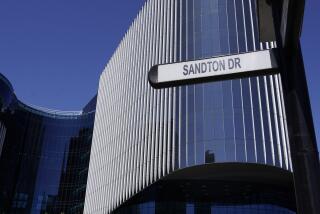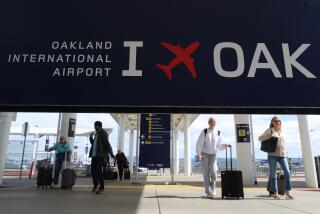Proposed Harvey Milk airport name change hits turbulence in S.F.
- Share via
SAN FRANCISCO — John Wayne has one. Louis Armstrong has one. Shoot, even Imelda Marcos, shoe queen and former first lady of the Philippines, has one. And John F. Kennedy? He has three airports named in his honor.
But here in the vibrant heart of gay America, the push to change the name of San Francisco International Airport to commemorate slain civil rights activist Harvey Milk has run into turbulence.
Supervisor David Campos, who floated the idea to make the airport the first in America to be named after an openly gay leader, argues that the moniker Harvey Milk SFO will “make our airport a beacon of hope” around the world “for all individuals who are bullied, discriminated against and abused.”
But in a recent poll, nearly two-thirds of those surveyed gave the name change an emphatic thumbs down. The San Francisco Chronicle and the Bay Area Reporter, the area’s largest gay publication, have editorialized against the idea.
And though an online petition asking the supervisors to change the airport’s name recently hit 20,000 signatures, much of the Internet commentary has been scathing:
“This ranks up there with the local insanity of proposing to drain Hetch Hetchy reservoir,” wrote one poster, referring to a plan to turn a major water source back into a verdant valley, a ballot measure that died last November. “Like they say: ‘You can’t fix stupid.’”
Nearly 35 years have passed since Supervisor Milk and Mayor George Moscone were assassinated by Dan White, spawning the phrase “Twinkie defense” and turning Milk into a gay rights icon.
Although he served just 11 months in elected office, Milk has been the subject of an opera, two movies and a children’s book. Barack Obama awarded him a posthumous Presidential Medal of Freedom. California celebrates Harvey Milk Day on May 22.
But it wasn’t until Campos traveled to Barcelona, Spain, in 2010 on a sister-city foray that he said he realized what an international profile Milk has. That trip, Campos said, also got him thinking about how important international airports are as geographic and cultural gateways.
“There are more than 80 airports in this country alone that are named after individuals,” he said in a recent interview. “At some point, an openly gay or LGBT person should get that recognition. …I just think that if it doesn’t happen in San Francisco, where will it happen?”
Airport officials have pegged the cost of changing signage at SFO — which had a record 44.5 million passengers last year — at about $4 million. And then there are the intangible costs of tweaking a treasured trade name.
San Francisco “is a great brand, and we don’t believe it should be tampered with,” said Jim Lazarus, senior vice president for public policy at the Chamber of Commerce, whose recent poll showed 61% opposed to the idea.
If activists want to honor Milk, he said, they could do what Los Angeles International Airport did for former Mayor Tom Bradley: Name a terminal in his honor. Or they could tap the airport’s accredited museum to put up a permanent exhibit on Milk’s place in the civil rights movement.
“Let’s tell the story for those millions of travelers who go through SFO, without changing the name on the front door,” Lazarus said.
The proposal is expected to have its first hearing before a Board of Supervisors committee in the next few weeks. The full board could vote as soon as April on whether to change the name themselves or put the matter before voters in November.
Stuart Milk, Harvey Milk’s nephew and a gay rights activist himself, thinks the time is ripe for Harvey Milk San Francisco International Airport. Such a gesture, he said, is both possible and necessary.
Just think what it would be like to fly into an airport named for a gay martyr, he said, if you are coming from a place like Qatar or Singapore, “where it’s illegal to be LGBT.”
“When you talk about an international airport, it has an impact that goes further than the community or country it serves,” Stuart Milk said. “It sends a global message.”
More to Read
Sign up for Essential California
The most important California stories and recommendations in your inbox every morning.
You may occasionally receive promotional content from the Los Angeles Times.











